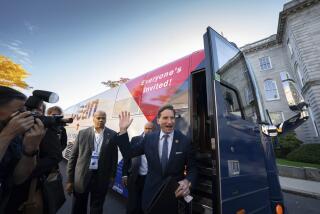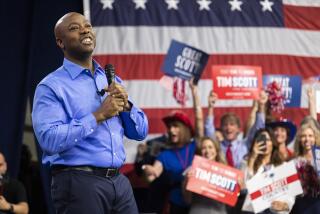Dole-Forbes Clash Becomes GOP Main Event
- Share via
MANCHESTER, N.H. — Steve Forbes’ dramatic surge in the polls has, at least for the present, transformed the campaign for the Republican presidential nomination from a futile pursuit of the front-runner into an actual race--a fiercely competitive struggle between Sen. Bob Dole and the millionaire publisher.
Two weeks before the ballots are cast in the campaign’s first full-scale official competition--Iowa’s caucuses on Feb. 12--the contest is now entering a crucial stage. With Dole and other rivals pounding away and with the press intensifying its scrutiny of his background and positions, Forbes faces a period of testing that amounts to both an ordeal and opportunity. Because of that, his performance in the next handful of days will probably determine whether his candidacy fades away as swiftly as it took off or continues to soar.
“How he [Forbes] will stand up to all that is the great unknown,” said Iowa GOP Chairman Brian Kennedy.
For the present, most GOP professionals agree with the assessment of veteran Republican consultant Eddie Mahe: “Steve Forbes is in the top tier of candidates. . . . Right now the only other guy in the same tier is Bob Dole.”
Most GOP insiders still expect Dole to prevail in the end. But even if he does, the fact that he has been forced to respond to Forbes’ challenge could harm his prospects for the general election against President Clinton--forcing Dole to eat up money and energy that he could otherwise have expended later this spring against the Democratic incumbent.
Meanwhile, if Forbes is cause for alarm in the Dole camp, he is even worse news for the other principal GOP hopefuls: Sen. Phil Gramm of Texas, conservative commentator Patrick J. Buchanan and former Tennessee Gov. Lamar Alexander. For months those three had geared up to spend the next several weeks chasing Dole. Instead, they find themselves trapped behind Forbes, who stands squarely in the path of any one of them emerging as Dole’s chief challenger.
“If we had talked about this a year ago, this is not a scenario anybody would have envisioned,” said David Carney, Dole’s senior strategist in New Hampshire, which will hold its primary on Feb. 20.
Dole’s advisors had expected the Senate GOP leader to be locked in a struggle with Gramm, whom they confidently assumed they could grind into the dust when he ran out of money. But Forbes’ treasury, by contrast, is a seemingly bottomless pit.
*
Forbes’ campaign manager, Bill Dal Col, says his candidate spent $15 million in 1995 after announcing his candidacy late last September, compared to the roughly $20 million Dole and Gramm each spent during the entire year. So far this year, Forbes’ spending is close to an additional $5 million, Republican sources estimate.
The actual disparity between Forbes’ spending and that of his rivals is even greater than those numbers would suggest because Dole and Gramm spent large amounts of money last year on raising money. Forbes, by contrast, could concentrate his spending on actual campaigning. In addition, because Dole and Gramm are financing their campaigns in part with federal funds that match individual donations, they must abide by ceilings on what they can spend in individual states. Forbes, who is not taking matching funds, faces no ceiling on his Iowa or New Hampshire spending.
Tom Rath, senior advisor to the Alexander campaign and a longtime GOP activist here, calculates that Forbes’ television buy in New Hampshire totals about 2,000 gross rating points, meaning that the average viewer would have seen a single Forbes ad 20 times--roughly double what Dole and Alexander are buying.
What worries Republicans is that the exorbitant cost of this struggle against Forbes could leave Dole, even if he wins, virtually broke all through the spring, unable to do anything more aggressive than draft his convention acceptance speech. Meanwhile, Clinton will be able to use the roughly $25 million that he has raised in primary-season campaign funds to burnish his image. Because Clinton does not face any serious primary challenge, he can use his campaign treasury as he sees fit--almost certainly on getting a head start on the fall campaign.
For now, however, Forbes’ vast resources leave Dole little choice but to strike back at the publisher with attack commercials--what Dole’s aides prefer to refer to as “contrast” ads.
“Between you and me, they are scared of his money,” said one Republican consultant familiar with the Dole campaign. “If you look at it from their standpoint, part of your support comes to you mainly because you are the front-runner. By definition, that’s thin [support], and you’re scared of anybody who might puncture this balloon.”
Dole himself has begun taking off after Forbes with his favorite weapon--sarcasm. “We’ve got somebody out there talking about how a flat tax will cure everything--headaches, bunions, any problems you’ve ever had,” he said while campaigning in Iowa.
But while Dole insists that he will prevail, he admits that Forbes’ attacks have stung. “Millions of dollars of negative advertising--it’s terrible. I might not even vote for myself,” he joked recently while campaigning. His own campaign polls, he conceded, show Forbes narrowing the gap.
*
For Forbes, the attacks from his rivals present a severe challenge to his relatively untried skills as a campaigner.
But along with his vast personal wealth, Forbes’ great strength, analysts say, is his intensity and focus. “This is a candidate who knows how to stay on message,” said Fred Steeper, who polled for George Bush in 1992 and is an informal advisor to Dole.
Now the question is whether Forbes can maintain his concentration and still defend himself.
His advisors have prepared him for this trial. “Wherever we see that our opponents are distorting the message, we will correct the distortion and we will stay on our message,” Dal Col said.
But some wonder if Forbes is temperamentally suited to the role he now must play. “He’s not a great campaigner,” Kennedy said. “He’s shy and painfully mild-mannered.”
Still, the 48-year-old publisher showed that he can think on his feet during a breakfast talk last week in Des Moines. When the overhead lights flickered momentarily, he quipped: “See, this is Washington turning out the lights.” He went on to provide a point-by-point response to the barrage of criticism of his flat-tax plan, dismissing the naysayers as “fear-mongers” so enmeshed in the status quo they can’t see another way of doing things.
Forbes also was shrewd enough to try to minimize expectations for his own prospects in Iowa. The late start of his candidacy there puts him at a disadvantage, particularly because the state’s caucus system, which requires voters to spend several hours at a meeting in order to cast ballots, puts a premium on building a strong grass-roots organization.
“My opponents have had a two-, three-year [head] start,” he said. “I think I’ll make a very respectable showing on Feb. 12.”
Even Forbes’ problems, however, may be of assistance to him. His awkwardness on the campaign trail, for example, may help reinforce the perception of him as an outsider, which has been an important asset for his candidacy. “He has sort of transformed himself from ‘Mr. Flat Tax’ into ‘Mr. None of the Above,’ ” said David Keene, who was Dole’s 1988 campaign manager. “It’s unbelievable for one of the wealthiest people in America to sell himself as an anti-establishment figure, but that’s what he has been able to do.”
Even the attacks on him by the other candidates probably help bolster the outsider impression, Keene noted.
As for the other candidates, for now they are struggling to avoid becoming bystanders.
Alexander’s aides talk loftily of their candidate’s accentuating the positive by unveiling a new plan for job training. But they also unleashed a new ad aimed at Forbes, which tells voters their choice is between “Malcolm the mudslinger” and “Lamar Alexander the real tax-cutter.”
Meeting with supporters in Des Moines, Alexander felt obliged to commence his remarks by responding to a Forbes campaign commercial that sneered at the red flannel shirt the former Tennessee governor wears as a symbol of his claim to be an outsider. “I never expected to wake up this morning in Des Moines and see a vicious and misleading attack on my red and black shirt,” Alexander said.
Similarly, Charles Black, Gramm’s chief strategist, briefing reporters in Des Moines by phone from Washington, had to concede that Forbes’ flat-tax proposal had focused attention on the issue of tax reform, which Gramm himself had addressed by introducing his own flat-tax plan.
“Now that he [Forbes] has run all of that TV out there [in Iowa], people are interested in tax reform,” Black said.
*
As for Buchanan, his New Hampshire campaign manager, Paul Robbio, contends that his candidate will do well here because of a strong field organization and his appeal to conservatives on social issues, such as opposition to abortion, which Forbes scarcely mentions.
“We never expected to outspend any of these guys anyway,” Robbio said.
The one bright spot for the current also-rans, or at least for their handlers, is that Forbes has made the contest more interesting. Before Forbes entered the race, “it was kind of like sitting in a Jacuzzi without the bubbles on,” said James Courtovich, Gramm’s New Hampshire honcho. “When Forbes came in, he flicked the switch on the election up here.”
Times staff writer Nancy Hill-Holtzman in Iowa contributed to this story.
(BEGIN TEXT OF INFOBOX / INFOGRAPHIC)
POLL WATCH: Dole, Forbes are the Front-Runners
With the Iowa caucuses and the New Hampshire primary just weeks away, the GOP field of presidential contenders has turned into a two-man race. In both states, Sen. Bob Dole and magazine publisher Steve Forbes have distanced themselves fro the other candidates with Forbes narrowing Dole’s once substantial lead.
IOWA
Nov. ’95
Dole: 36%
Forbes: 8%
Jan. ’96
Dole: 26%
Forbes: 18%
New Hampshire
Nov. ’95
Dole: 27%
Forbes: 7%
Jan. ’96
Dole: 30%
Forbes: 22%
Analysis:
These surveys, among likely caucus and primary voters, do not mean the other Republican candidates should call it quits. In both states, undecided respondents make up around 20-25% of the potential electorate. Dole aides insist that Forbes’s rise in the polls has slowed.
Source: American Research Group and PSI Services for Marketing and Survey Research.
More to Read
Get the L.A. Times Politics newsletter
Deeply reported insights into legislation, politics and policy from Sacramento, Washington and beyond. In your inbox twice per week.
You may occasionally receive promotional content from the Los Angeles Times.










